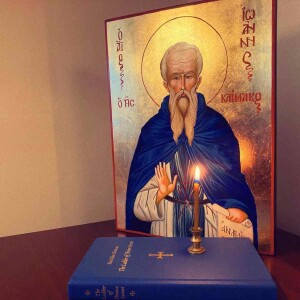Gustave Flaubert once wrote, “God is in the details.“ The truth of this statement is born out in this evening‘s writing from Saint John Climacus on the fathers’ understanding and description of the development of a passion within the soul. With great clarity, St. John takes us step-by-step through the inner movements of the mind and the heart. The battle begins with an assault. An image or an idea is encountered for the first time and enters into the heart. There’s no sin in this, but our response is important nonetheless. If we begin to converse with the image or idea its presence will take us a step further. We cannot allow ourselves to linger with such images even if we do not seem to be moved by them. Eventually, Saint John tells us, if we do linger we can fall into consent; the soul bends down, as it were, and begins to take delight in the temptation. Such temptations can also come upon us with force; seeking all at once to destroy any semblance of order or peace within the heart. What is important is that we struggle; that we engage in the spiritual battle and fight with equal or greater force against what seeks to afflict us. A passion develops whenever a sin nestles with persistence in the soul and forms a habit. It is then that the sins has put down deep roots and begins to guide and direct our decisions and actions. The passion is unequivocally condemned in every case. St. John tells us, therefore, that we must seek to cut off the first assault with a single blow in order to prevent everything that might follow.
Finally, Saint John reveals to us just how humble we must be in the spiritual warfare. There are temptations that can come to us that he describes as a “flick of the mind”. They are instantaneous and inapprehensible. There can be something in our life that triggers a memory or movement from the depths of our unconscious. It gives rise to or stirs a passion that has not been healed, but merely buried. All of this teaches us that our desire must be directed toward God and God alone. The human heart can be a treacherous thing, and as the prophet asks, “who can trust it?“ It is God alone who we must trust. We must hope in his promises and the grace that he offers us from moment to moment. This is our path to healing.
---
Text of chat during the group:
00:14:15 FrDavid Abernethy: page 150 para 72
00:15:34 angelo: Reacted to "page 150 para 72" with 👍
00:19:25 Daniel Allen: Joined a little late, where are we at?
00:19:40 Bonnie Lewis: 72
00:19:55 Daniel Allen: Thank you
00:20:05 Bonnie Lewis: Reacted to "Thank you" with 👍🏻
00:20:37 Anthony: Read Agatha Christie, and this doesn't seem to strange.
00:40:17 Lawrence Martone: Pope Shenouda says “Be aware then, of the first step toward sin and run for your life. You are not stronger than Adam…”
00:40:49 carol nypaver: 😲
00:43:16 Louise: Would you say that repentance involves feeling pain from having hurt another? This pain thus becomes a stimulus to possibly prevent the future repetition of this sin.
00:52:31 Anthony: A person can be so focused on avoiding temptation that the person's psychology or demons or something else can constantly bring to mind the thing to be avoided - kind of making the temptation always present. Maybe it's an after-effect of eating from the tree we were not to eat.
01:06:49 Cindy Moran: Going postal
01:07:34 LauraLeigh: Blindsided.
01:10:31 Rory: May I speak
01:10:55 Patrick: Fr. David, can you please clarify the meaning of 'dispassion' in the last sentence of 15.74? Is it synonymous with asceticism in this context?
01:11:18 Anthony: But is he saying the flick of the mind actual moral guilt? How much of this fault, how much is over-focus on the self? Be focused too much on this, be too sensitive, and you can go nutty, not be a "man fully alive." That's surely not good. Our Lord was supremely sensitive to good and evil, but He was also self-possessed.
It's possible even these saints went a little self-obsessed and accidentally project that forward to us. It interferes with life to always be aware of every possibly evil and continually feel guilty.
01:16:31 Daniel Allen: How does this relate to Christ saying, “Do not let your heart be troubled. Believe in God, believe in Me also.”
01:17:54 Daniel Allen: To expand on that question, if a flick of the mind can cast us into sin without any noticeable stimulus how does one not become troubled?
01:18:39 Ren Witter: Replying to "How does this relate..."
Maybe the context of that is pretty important in this case. At that moment he is speaking about his crucifixion. At the same time, he also says of the peace he wants his disciples to have: “not as the world gives it do I give it to you."
01:20:40 David Swiderski: One must quiet the mind to hear the voice of God who is like a whisper on the wind while the devil is a constant irritating and rattling of the passions.
01:21:07 Bonnie Lewis: Reacted to "One must quiet the m..." with 👍🏻
01:21:35 Rebecca Thérèse: Thank you 🙂
01:22:14 Cindy Moran: Replying to "How does this relate..."
Thank you Father!
01:22:23 David Swiderski: Thank you Father!
01:22:25 Bonnie Lewis: So beautiful. Thank you Father David.
01:22:28 kevin: thanks Ren and Fr

1 years ago
appreciate this. the world needs this.